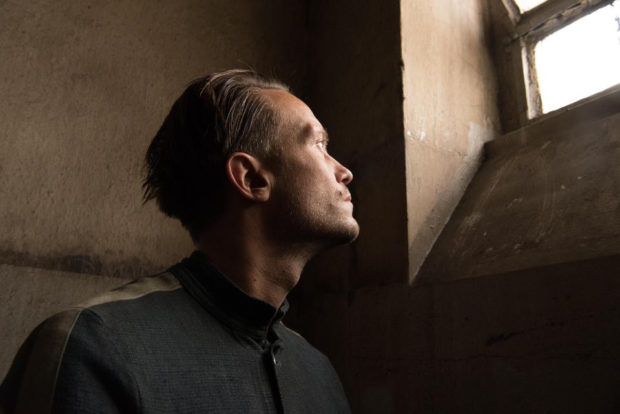You have no items in your cart. Want to get some nice things?
Go shopping
“You must remember what you believed to be right when everything was good.”
Viktor E Frankl, Holocaust survivor and author of Man’s Search for Meaning once wrote: “Everything can be taken from a man but one thing: the last of the human freedoms, to choose one’s attitude in any given set of circumstances, to choose one’s own way.” Stripped of his belongings, herded and tattooed like an animal into the abyss of concentration camp life, his thoughts transcended above the grim reality that faced him, and became the shepherd to the last thing he owned, his mindset. Alleviating the terror of having his physical freedoms taken from him, it was the control of his own attitude, in spite of the situation, he believed, that set him free.
These same circumstances also confronted Franz Jagerstatter in 1943, forming the focus of Terence Malick’s film, when after publicly condemning the Nazi party, was called up for national service to fight for Germany. A farmer with three children, Franz lived in a beautiful corner of the world named Radegund (wonderfully captured by DP Jorg Widmer), a village so peaceful and idyllic, one would believe it was untouched by the war raging throughout Europe. But the burden of war is not only marked by the blackening of fields and the flattening of landscapes, but by the lives of the ordinary people who suffer its grasp. Thus the lives of those who lived peacefully in Radegund, located in upper annexed Austria, was shifted when the war began in 1939, as no doubt many small towns and villages were throughout rural Europe, as their town became another cog in the national war machine.
Prior to the draft, Franz, to the dismay of his community and at the cost of his families’ reputation, openly discussed being anti-Nazi. Aware of the consequences of opposing the draft, his wife, Franziska, fought against her husband to protect her family. Pressure fell on Franz from everywhere to alleviate the suffering he caused the local population, who feared his beliefs would cause further harm to the place whose culture was already being suppressed and whose agriculture was being stolen. Ill times fell upon the citizens of Radegund, and as the struggle mounted as they worked to support Germany’s war effort, Franz’s refusal to help contribute to their efforts was met with bitter disgust by the community. Brought on by his own experience with the army, his exposure to war crimes committed by soldiers and the suppression of the church by the state, he became bound to the belief that the war was wrong, and so had to wrestle between the fate of himself and his family, with the indifferent constant of his conscience. Knowing he would be executed and his family left exiled and fatherless, the internal struggle within himself consumed his every moment, with only his faith in true justice to keep him strong.
But what does one do when faced with the choice of two sufferings? To submit, and thus suffer the guilt of having given in to something you know to be wrong? Or uphold your principles and suffer the due consequences of staying true to what you believe. For Franz, it was to become traitor to his country or his own soul, the penalty of certain death or a lifetime of guilt. Terence Malick’s A Hidden Life examines precisely this aspect of Franz’s remarkable story, in which he also explores mightily philosophical questions: Is it not the worlds doomed fate for us to act selfishly in the face of truth and virtue? Would that be the catalyst for evil to enslave us? Should one support the condemnable actions of others just because it is demanded of them, for fear of consequence? When faced with a suffering that is virtuous and true, versus a suffering that one knows is deceitful and false, what should they choose? All these questions and thematic explorations are investigated with a profound depth in Malick’s picture, and are best thought of in the context of how these small decisions and sacrifices may manifest themselves on a larger scale. A deeply catholic man, one whom feels his actions will speak louder than his words, when the time finally came; he refused to swear loyalty to Hitler, and refused to fight for his country.
With the weight of his wife, his family, his town and his country bearing down on him, Franz was forced to decide not only what was most important to him, but what he believed is most important for the world to continue prosperously. Detained and beaten, he lies on the prison cell floor writing to his beloved wife. He does not ask for forgiveness, but understanding. For he knows that if he swears loyalty, he can escape his punishment, return back to his family of whom he adored, return back to the village whom once adored him, and peace will be restored to the chaos he left behind. But at what cost? The victory of tyranny and the serving of criminals treated like kings. He had a profound sense of responsibility in the face of this injustice, and was willing to die for it.
As he descends further and further into the consequences of his convictions, the repeated shots in Malick’s picture of Jesus on the cross only serves to support the ideology behind his reasoning, and the objectivity in which Franz sees his situation. Surrendering himself to higher powers, he believed his fate was no longer for him to decide. When presenting paperwork, of which would prevent Franz’s sentence of death, a man proffers “Sign it. You will only work as a medic. You will be free.” To which Franz replies “But I am free”. It’s in his refusal to concede to the Nazi’s that he so profoundly believes has exerted his attained freedom. For if all else is taken from someone, when all physical freedoms are stolen, one always has the liberation of their own mind to remain in control. As Viktor E Frankl once wrote:
“Everything can be taken from a man but one thing: the last of the human freedoms, to choose one’s attitude in any given set of circumstances, to choose one’s own way.”
When you can face death knowing you lived what to be true, despite all suffering, is when one and all can begin to strive properly for true peace. Sebastian Krawinkel, production designer on A Hidden Life argued exactly this. “It’s such a perfect story for our days,” says Krawinkel. “If only more people would have the courage to stick to their beliefs and what’s right—not only right for them but right for society. It’s such a perfect story for our days.” Perhaps this is the lesson we all must take? Perhaps it was and is the quiet sufferings of unsung heroes that bring about change, small or large. Had the many conscientious objectors who stood up and defied their governors not done so, would that have brought about change? What side of history would we be sitting on had those people given into the powers at work, would their number have made the difference? For we all know the story of how one butterfly beats his wing and changes history for us all. This is the heart of the film and the story of Franz Jagerstatter. Would your principles collapse under the face of tyranny? “What happened to our country? To the land we love” he asks. It’s a line that resonates as profoundly in the context of his time as it does ours. His was a life lived that asked us the important questions, a little sacrifice for a greater cause.
Is it the names of those who we do not know, whose remains lie in unturned soil, untouched by the pity of our grief that may have made the difference? As George Eliot once wrote “..for the growing good of the world is partly dependent on un-historic acts; and that things are not so ill with you and me as they might have been, is half owing to the number who lived faithfully a hidden life, and rest in unvisited tombs”.

Joel Frank
Joel Frank is a graduate in Film Theory and Production who now writes about Film and Digital Culture. Aside from this, he writes about many things wonderful and depressing, and some things just in between.
- Web |
- More Posts(1)





Very interesting read – an engaging, moving piece, that explores the moral themes in Terence Malick’s film.